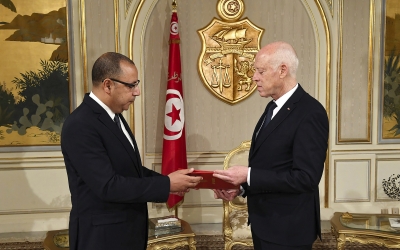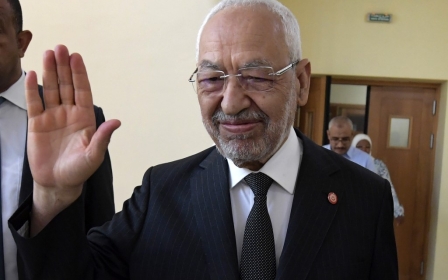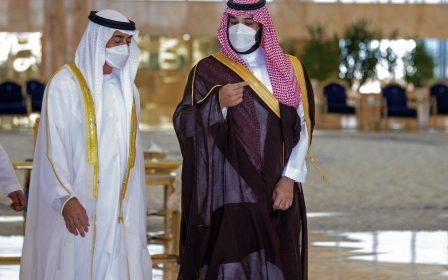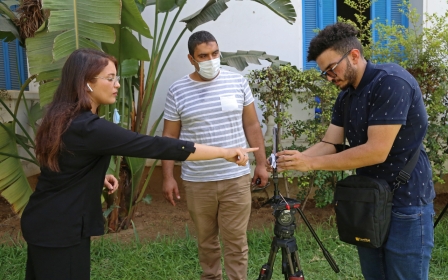Tunisia coup: President sacks head of state TV as purge of top officials continues

Tunisian President Kais Saied sacked the head of state television on Wednesday as a purge that has so far targeted at least 25 senior officials continued.
Saied has plunged the country into further political turmoil since his decision on Sunday to freeze parliament, oust the prime minister and assume executive and judicial powers in Tunisia for a period of 30 days. He has so far not presented a roadmap for his plan.
The president also lifted the parliamentary immunity of lawmakers, paving the way for their potential prosecution. Saied justified the move by citing a constitutional article that allows the head of state to take unspecified exceptional measures in the event of an "imminent threat".
While his supporters have seen the move as a decisive step to restoring stability in the crisis-ridden country, opposition politicians from across the political spectrum have denounced it, with Ennahda, the largest party in parliament, calling it a "constitutional coup".
On Wednesday, Tunisian judiciary announced a probe into Ennahda and two other political parties over allegations of foreign funding during the 2019 election campaign. It remains unclear whether the probe will mark the beginning of a crackdown on the parties.
New MEE newsletter: Jerusalem Dispatch
Sign up to get the latest insights and analysis on Israel-Palestine, alongside Turkey Unpacked and other MEE newsletters
A senior member of Ennahda told Middle East Eye on Wednesday that the probe "could be used as a pretext to set up an authoritarian regime" if the president continues to assume judicial powers.
Sacked officials
After sacking Prime Minister Hichem Mechichi, Saied went on to fire the defence and justice ministers on Monday.
On the evening of 27 July, the Tunisian presidency announced a series of new dismissals targeting officials in high state positions, according to the official paper Al-Raed.
Saied, who had assumed the duties of the state attorney general, issued a decree dismissing the director of military justice, Tawfiq al-Ayouni, and the head of the General Authority for Martyrs and Wounded People of the Revolution and Terrorist Operations, Abdul Razzaq al-Kilani.
The president also dismissed both Al-Muizz Lidin Allah al-Muqaddam, director of Mechichi's office, and the government's clerk, Walid al-Dhahabi.
Saied also sacked all eight advisers to the dismissed prime minister: Rashad bin Ramadan, Hassan bin Omar, Elias al-Ghariani, Osama al-Khuraiji, Abdel Salam al-Abbasi, Salim al-Tisawi, Zakaria Belkhoja and Mofdi Mesdi.
The dismissals also included nine other officials: Fathi Biar, Muhammad Ali al-Aroui, Hossam al-Din bin Mahmoud, Basma al-Daoudi, Ibtihal al-Attawi, Monji al-Khadrawein, Nabil bin Hadid, Bassam al-Kasho and Rawda bin Saleh.
On the evening of 28 July, Saied issued a decree dismissing Mohamed Lasad al-Dahesh, the general director of the country's state television, from his post, and assigning Awatef al-Dali to assume the position temporarily.
Saied had been locked in a political dispute with Prime Minister Mechichi for more than a year before his decision to sack him.
In the past few months, some observers have warned that they believed Saied was preparing to eliminate his opponents and strengthen his presidential powers.
There was particular alarm when, at the 65th anniversary of Tunisia's security forces in April, Saied gave a speech emphasising that he was the supreme commander of both the military and the country's internal security forces.
The president’s actions came two months after Middle East Eye revealed a letter written by Saied’s advisers urging him to seize control of the country using Article 80 of the constitution, which he now has. The former constitutional law professor was elected with over 70 percent of the vote in October 2019 despite his lack of prior political experience, except for his role in advising the government during the drafting of the 2014 constitution.
Saied, 63, ran in the presidential election as the ultimate outsider, without the backing of an established party or an apparent electoral machine, something that appealed across the political spectrum amongst Tunisians disillusioned with the country's paralysed political system.
Middle East Eye delivers independent and unrivalled coverage and analysis of the Middle East, North Africa and beyond. To learn more about republishing this content and the associated fees, please fill out this form. More about MEE can be found here.





